In a world where evil can lurk around every corner, it’s essential to reflect on our role in confronting it.
This article delves into Bible verses about seeing evil and doing nothing, reminding us of our responsibility as believers to take action against injustice.
Are you ready to explore the moral obligation to stand up against wrongdoings?
Drawing from timeless biblical wisdom, we’ll examine the consequences of inaction and the importance of righteousness.
We’ll also provide you with a selection of Bible verses that illuminate the path to being proactive in the face of evil.
As Proverbs 24:11-12 states, “Rescue those being led away to death; hold back those staggering toward slaughter. If you say, ‘But we knew nothing about this,’ does not he who weighs the heart perceive it? Does not he who guards your life know it? Will he not repay everyone according to what they have done?”
Join us as we navigate these powerful scriptures, challenging ourselves to actively oppose evil and to foster a world where goodness prevails.
Bible verse about seeing evil and doing nothing
James 4:17.

17 If anyone, then, knows the good they ought to do and doesn’t do it, it is sin for them.
Facing evil, it’s essential to know our duty to act and the impact of inaction. James 4:17 serves as a call to action for Christians. It highlights the need to actively fight evil and promote good.
We’ll examine the importance of recognizing our duty, our responsibility as Christians, aligning actions with faith, and the moral consequences of inaction.
The parable of the Good Samaritan (Luke 10:30-37) demonstrates the cost of inaction. A man, beaten and left to die, is ignored by a priest and a Levite.
The Good Samaritan, an outsider, shows compassion and helps. This story teaches the need to act against evil or suffering, regardless of social barriers.
Kitty Genovese’s tragic story illustrates bystander apathy. In 1964, she was attacked outside her apartment.
Many witnesses saw or heard the incident, but none intervened or called for help, leading to her untimely death. This event highlights the terrible outcomes when people don’t act against evil.
Proverbs 3:27 says, “Do not withhold good from those to whom it is due when it is in your power to act.”
Christians must confront and fight evil. Our faith demands that we not only recognize injustice but take real steps to address it. We must join the battle against evil and work to alleviate suffering and promote justice.
Understanding good and evil is crucial for guiding our actions.
Luke 12:47 warns, “And that servant who knew his master’s will but did not get ready or act according to his will, will receive a severe beating.”
This verse stresses the importance of acting in line with our faith and being aware of the consequences of inaction. Our beliefs should inspire us to stand against evil and strive for positive change.
We must also recognize the moral consequences of not acting against evil. When we ignore wrongdoing or refuse to confront injustice, we contribute to the perpetuation of evil.
Christians are called to be a light in the darkness, actively working to promote good and fight evil forces.
In conclusion, James 4:17 powerfully reminds us of our obligation to confront evil through action.
By recognizing our duty, accepting our responsibility as Christians, aligning actions with faith, and understanding the moral consequences of inaction, we can become agents of positive change and work towards a just and compassionate world.
John 9:41.
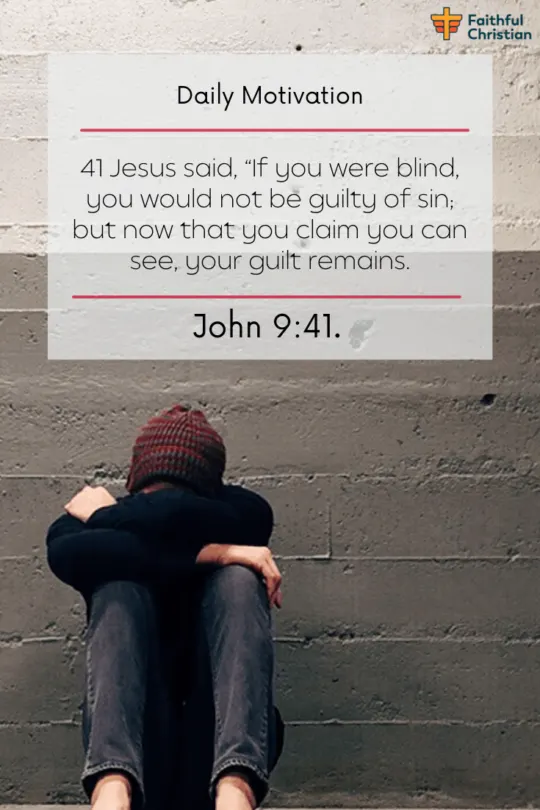
41 Jesus said, “If you were blind, you would not be guilty of sin; but now that you claim you can see, your guilt remains.
The Bottom line
In John 9:41, Jesus speaks to the Pharisees, saying, “If you were blind, you wouldn’t be guilty of sin; but now that you claim to see, your guilt remains.”
This profound verse emphasizes the peril of spiritual blindness in identifying and tackling evil, as well as the duty and accountability that accompany possessing the truth.
Spiritual blindness can hinder our ability to perceive evil’s true nature and take the necessary steps to confront it.
The Pharisees, although knowledgeable in the scriptures, were frequently blind to Jesus’ teachings and the good He brought to the world.
In Matthew 12:22-24, Jesus heals a man who was possessed by demons.
This act of healing gave the man back his sight and speech. Instead of acknowledging the miracle, the Pharisees accuse Jesus of collaborating with the devil.
Their spiritual blindness causes them to overlook the evil within and dismiss the good Jesus was doing.
Luke 12:48 states, “From everyone who has been given much, much will be demanded; and from the one entrusted with much, even more will be asked.”
In the context of spiritual sight, this verse reminds us that when granted truth and understanding, we must act accordingly.
The Pharisees, entrusted with sacred teachings, failed to live by them and even tried to undermine Jesus’ ministry.
The capacity to distinguish good from evil carries the responsibility to act on that knowledge.
When we possess spiritual sight, we must confront evil and advocate for what is right, just as Jesus did throughout His ministry. Recognizing evil is insufficient; we must also take action against it.
Honesty with ourselves is crucial when identifying evil, both within and in the world around us.
In Matthew 23:26, Jesus admonished the Pharisees. He said, “First, clean the inside of the cup and dish so that the outside may become clean as well.”
By this, He underscored the importance of confronting their own hypocrisy and self-deception before addressing external evils.
Self-awareness is essential in our battle against evil. We must examine our motives, beliefs, and actions to ensure we don’t unintentionally perpetuate evil.
The climate change crisis demonstrates individuals denying the severity and failing to act, despite knowing the facts. This inaction leads to long-term consequences for our planet, affecting future generations and ecosystem health.
In conclusion, John 9:41 serves as a powerful reminder of spiritual sight’s importance and the responsibilities it entails.
We must recognize the dangers of spiritual blindness, hold ourselves accountable for our actions, and understand the connection between spiritual sight and responsibility.
Combat evil by promoting self-awareness and defeating self-deception.
John 13:17.

17 Now that you know these things, you will be blessed if you do them.
The Bottom line
John 13:17 reminds us of the importance of both knowing and acting on our beliefs, especially when facing evil.
Let’s explore this verse, its relevance to witnessing evil without taking action, and examine related scriptures and real-life examples.
Jesus emphasized the value of applying His teachings in the Parable of the Wise and Foolish Builders (Matthew 7:24). The wise builder constructs his house upon a rock, symbolizing a life built on Jesus’ teachings.
When encountering evil, it’s essential to act on these teachings instead of merely knowing them. By following Jesus’ guidance, we can confront evil and promote a more just and loving world.
Acting on our knowledge of Jesus’ teachings brings blessings associated with living a life aligned with God’s will. James 1:22 tells us to be “doers of the word, and not hearers only.”
Failing to act when witnessing evil means missing out on the blessings that come from living a life filled with Jesus’ love, compassion, and justice.
The rich young ruler (Matthew 19:16-22) knew Jesus’ teachings but struggled to follow them wholeheartedly. He couldn’t part with his wealth, even understanding the importance of helping the poor.
This story highlights the gap between knowing what’s right and doing it. We must take action when faced with evil, as knowing isn’t enough.
Obedience to Jesus’ teachings plays a crucial role in fighting evil. Merely acknowledging or agreeing with His message isn’t sufficient; we must obey His commandments.
Consider the workplace bullying example. A person witnessing a colleague’s mistreatment and doing nothing fails to follow Jesus’ call to love and support one another.
By intervening and helping the victim, they would show obedience to Jesus’ teachings and actively fight against evil.
Applying Jesus’ teachings is a powerful weapon against evil. When witnessing evil and engaging in loving, compassionate, and just actions, we can profoundly impact those around us.
Think about the positive change in a workplace if employees stood up against bullying and supported their colleagues. By actively applying Jesus’ teachings, we can foster a more compassionate and just world.
In conclusion, John 13:17 underscores the importance of acting on Jesus’ teachings when confronting evil.
By following His guidance, embracing the blessings of obedience, and understanding the distinction between knowing and doing, we can actively fight evil and create a more loving and just world.
Let the biblical example of the rich young ruler and the real-life workplace bullying situation inspire us to stand against evil and make a difference in our communities.
John 15:22.

22 If I had not come and spoken to them, they would not be guilty of sin; but now they have no excuse for their sin.
John 15:22 offers a powerful message about responsibility and knowledge. Jesus says that without His teachings, people wouldn’t be guilty of sin. But now, they can’t excuse their actions.
This highlights our duty to act against evil when we know the truth.
The tale of Jonah and Nineveh shows how ignorance plays a role in evil. Nineveh, a wicked city, was unaware of its sins. God sent Jonah to preach to them, and they repented once they knew the truth (Jonah 3:1-10).
Before, ignorance protected them, but now they had to act responsibly.
Luke 12:47-48 and Romans 2:12 echo this idea. Both warn that knowing the truth carries an obligation. When we’re aware of what’s right, we must respond.
In everyday life, we face situations where action is needed. For example, a person uncovers corruption in their company.
They must decide whether to report it, risking backlash, or stay silent, letting the harm continue. Inaction might seem easier but allows evil to thrive.
To fight evil, we must share the truth with others. By doing so, we enable them to make informed decisions and join the battle against wickedness. Like in Nineveh’s story, one person can spark change, but it takes bravery to speak up.
Truth and accountability are linked. When we know the truth, we’re responsible for our actions or inactions against evil.
Christians should follow Jesus’ teachings and align our lives with the truth. This signifies that we possess a moral obligation to confront evil and contribute to building a better world.
In summary, John 15:22 reminds us of our responsibility when we know the truth. Ignorance may shield us from evil’s consequences, but once we’re aware, we’re accountable for our actions.
To truly combat evil, we must act, share the truth, and stand firm against wickedness. In doing so, we honor our faith and strive for a world free of darkness and sin.
2 Peter 2:21.
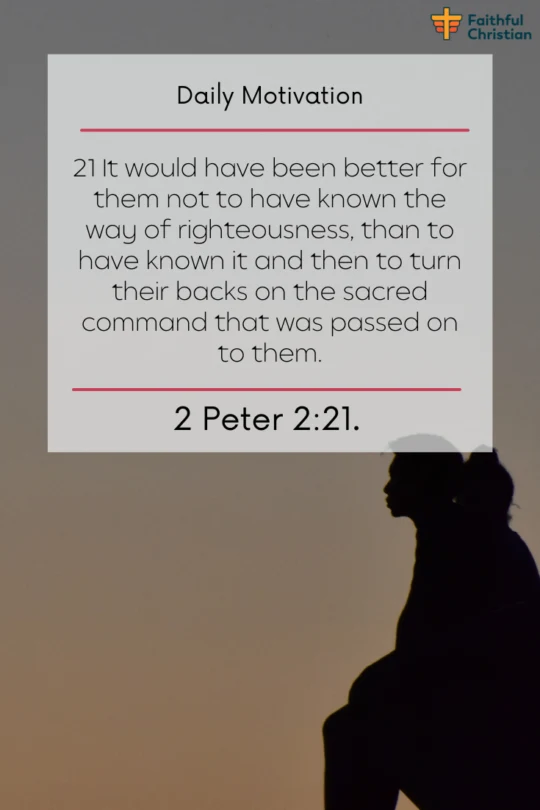
21 It would have been better for them not to have known the way of righteousness, than to have known it and then to turn their backs on the sacred command that was passed on to them.
The Bottom line
Facing evil calls for action and standing firm in righteousness.
The Bible verse, 2 Peter 2:21, emphasizes the perils of ignoring truth once revealed: “For it would have been better for them not to have known the way of righteousness than having known it, to turn from the holy commandment delivered to them.”
This verse teaches that failing to act on or rejecting truth has serious consequences.
Hebrews 10:26 supports this idea, stating, “For if we go on sinning deliberately after receiving the knowledge of the truth, there no longer remains a sacrifice for sins.”
This verse shows that intentional inaction, even with an awareness of the truth, bears grave consequences.
Luke 12:47 adds, “And that servant who knew his master’s will but did not get ready or act according to his will, will receive a severe beating.”
A poignant biblical example is Judas Iscariot, one of Jesus’ disciples. Despite knowing Jesus’ teachings, Judas betrayed him for thirty pieces of silver (Matthew 26:14-16).
Judas’ story shows that knowing the truth is not enough; commitment and perseverance in fighting evil are also essential.
In everyday life, we can face the temptation of returning to sinful behaviors after learning about their dangers.
A recovering drug addict, for example, may relapse after rehab, jeopardizing their health and relationships. This highlights the importance of unwavering commitment when confronting evil.
To effectively combat evil, consider these principles:
- Recognize the danger of turning away from truth once it’s known. Stay vigilant and committed to the truth, resisting temptation and compromise.
- Understand the consequences of rejecting the knowledge of righteousness. Always strive to act in line with our knowledge and understanding, as rejecting the truth has severe consequences.
- Embrace the role of commitment in confronting evil. Stand firm against evil with strong convictions and an unwavering determination to uphold righteousness.
- Acknowledge the importance of perseverance in fighting evil. Remain steadfast amid adversity, continually seeking growth in faith and understanding to better confront evil.
- Be aware of the risk of returning to a sinful life after knowing the truth. Actively resist the temptation to revert to sinful behaviors and habits.
In conclusion, 2 Peter 2:21 serves as a potent reminder that knowledge of the truth comes with great responsibility.
We must stay committed to fighting evil, persevering in our pursuit of righteousness, and refusing to yield to temptation.
Judas Iscariot and the recovering drug addict’s examples underline the importance of remaining steadfast amid adversity and temptation.
By embracing these principles and applying them to our lives, we can become more effective in confronting evil and promoting goodness in our world.
Romans 1:32.
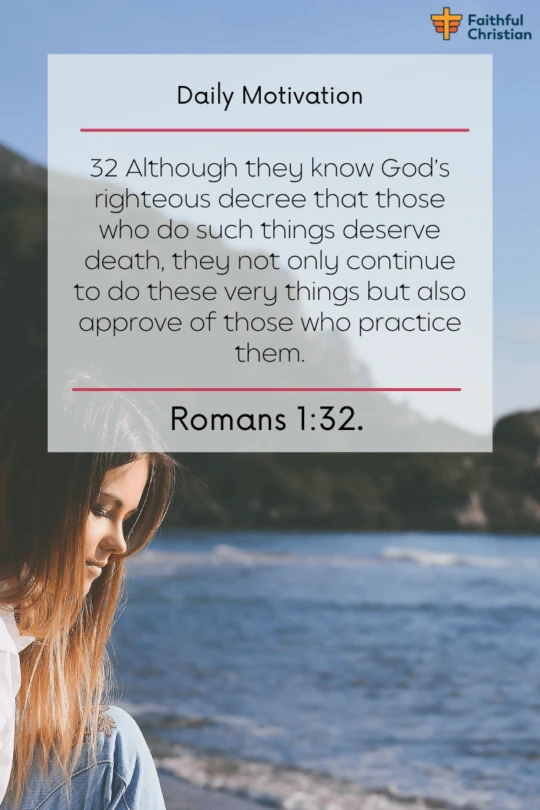
32 Although they know God’s righteous decree that those who do such things deserve death, they not only continue to do these very things but also approve of those who practice them.
In a world riddled with moral ambiguity, Romans 1:32 serves as a potent reminder. This verse warns against condoning evil actions and urges us to stand against wicked deeds.
We’ll explore Aaron’s biblical example and a real-life situation involving a neglectful parent.
Romans 1:32 highlights the peril of complicity in evil. When we don’t act against wrongdoings, we allow them to persist. Proverbs 24:11-12 urges us to rescue those facing death and hold back those on the brink of disaster.
Aaron’s story exemplifies the consequences of complacency (Exodus 32:1-6). Despite knowing that idolatry was wrong, he did nothing to stop the Israelites from worshiping the golden calf.
This inaction led to severe punishment for the people and a painful lesson for Aaron. Isaiah 5:20 emphasizes the need for discernment in identifying and rejecting evil.
In our world, it’s easy to overlook wrongs around us. A real-life example is a parent aware of their child’s criminal activities but not intervening.
This passivity allows the negative behavior to continue and possibly escalate, leading to harmful consequences for the child and society.
The Bible calls for Christians to separate from evil and oppose it. It’s our responsibility as believers to recognize the destructive power of evil and actively work against it.
Romans 1:32 cautions against approving sinful actions and invites us to embrace discernment and stand for righteousness.
In conclusion, Romans 1:32 reminds us of the importance of addressing evil.
By examining Aaron’s biblical example and the real-life scenario of a neglectful parent, we understand the consequences of complacency and the need for proactive engagement against evil.
Through discernment, courage, and faith, we can combat wickedness and foster a world reflecting God’s goodness.
Romans 12:9.
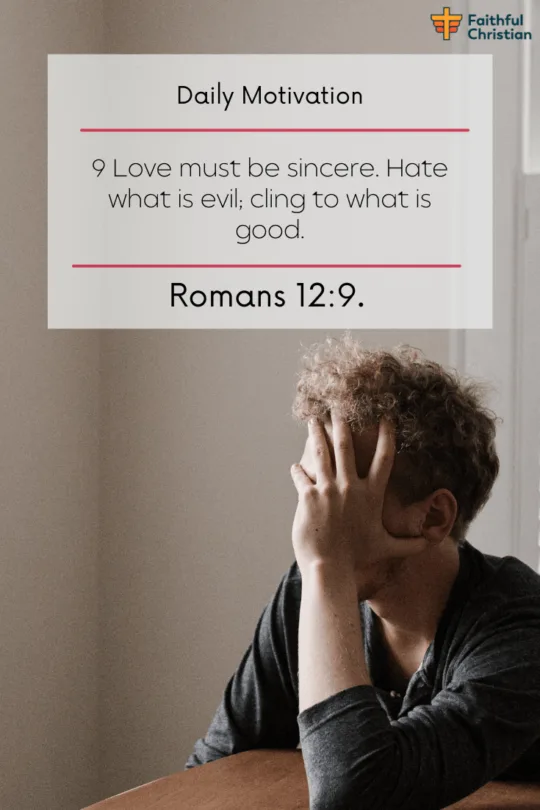
9 Love must be sincere. Hate what is evil; cling to what is good.
Romans 12:9 urges Christians to actively fight evil and hold fast to goodness.
This verse emphasizes the role of genuine love in battling evil, the strength of unity, the importance of discernment in identifying evil, and the necessity of sincere love in pursuing good.
The call to confront evil and embrace good is a vital message for believers. Ephesians 5:11 supports this, encouraging Christians to expose the deeds of darkness rather than partake in them.
As Christ’s followers, we can’t ignore evil but must face it with faith, love, and justice.
True love is the foundation of our struggle against evil. 1 Thessalonians 5:22 tells us to “avoid every kind of evil.” This includes not just avoiding evil acts but cultivating love to actively resist darkness.
Sincere love enables us to confront injustice, even when it’s tough.
Unity is a mighty force in battling evil. When believers unite with common goals, they form a powerful front against darkness.
The Laodicean church, mentioned in Revelation 3:14-22, exemplifies the consequences of lukewarm faith. A unified community of believers can significantly impact the fight against wickedness.
Discernment is vital in recognizing evil and taking proper action. Being aware of evil isn’t enough; we must discern its nuances and differentiate right from wrong.
With the Holy Spirit’s guidance and Scripture’s wisdom, Christians can develop discernment and confront evil in all forms.
Authentic love is crucial in our quest for good. As Christians, our actions should be driven by selfless love, focusing on others’ well-being and God’s glory. In the fight against evil, love is our strongest weapon.
A real-life example of confronting evil is seen in communities that don’t address systemic racism. Passivity or indifference allows discriminatory practices and attitudes to continue, further marginalizing minorities.
However, when people unite in love, they can challenge harmful systems, promote equality, and build a just society.
In conclusion, Romans 12:9 invites believers to actively oppose evil and pursue good.
By nurturing sincere love, uniting, cultivating discernment, and acting with genuine love, Christians can be agents of change in a world where evil often goes unchecked.
Let this verse inspire us to take responsibility in our battle against darkness.
1 John 3:18-20.
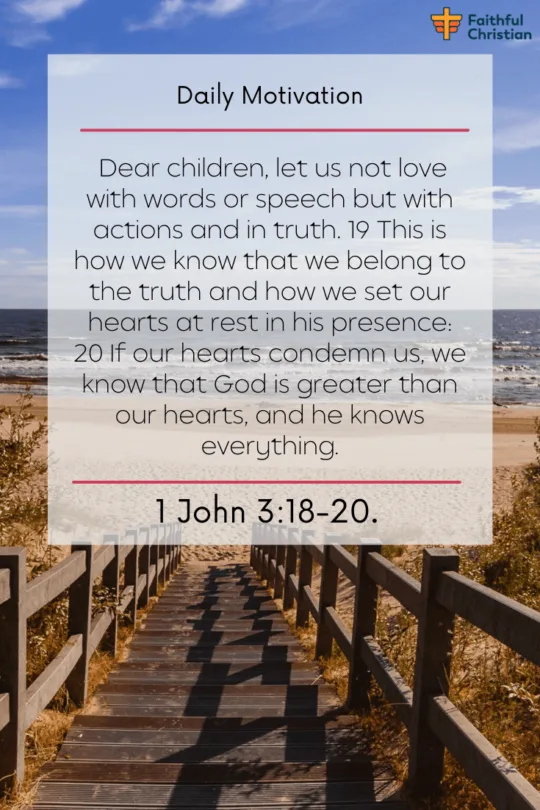
Dear children, let us not love with words or speech but with actions and in truth. 19 This is how we know that we belong to the truth and how we set our hearts at rest in his presence: 20 If our hearts condemn us, we know that God is greater than our hearts, and he knows everything.
In a world plagued by evil, we must show our love through action. The powerful message in 1 John 3:18-20 reminds us that love goes beyond words.
It calls for compassion, practical love, and a willingness to overcome guilt and inaction.
A striking biblical example is the city of Sodom, which was destroyed due to the pervasive wickedness of its inhabitants.
They neither turned away from evil nor sought peace (Genesis 19:1-29). This account highlights the devastating consequences of failing to confront and address the presence of evil in society.
Similarly, in the real world, consider a community that fails to address gang violence. By allowing it to persist and escalate, crime increases, and fear and suffering spread among residents.
This situation demonstrates the importance of actively fighting against evil and promoting peace and justice within our communities.
James 2:15-16 emphasizes the emptiness of words without action. If we see someone in need and only offer kind wishes, our faith is fruitless. It’s our responsibility to provide practical help and genuine care.
Matthew 25:31-46 shows the significance of addressing evil with compassion. Jesus judges the righteous and unrighteous based on their treatment of the vulnerable. By loving those in need, we express our love for God.
As believers, we should recognize the power of practical love against evil. Love in action can change lives, bring hope, and shine Christ’s light in a dark world. Engaging in compassionate acts helps us conquer guilt and inaction.
In conclusion, 1 John 3:18-20 urges believers to express love through real action.
By learning from the story of Sodom and acknowledging the consequences of inaction in our own communities, we can combat evil and make a positive impact.
Embracing Jesus’ teachings in Matthew 25:31-46 and James 2:15-16, let’s strive for authentic love, always remembering that actions, not words, demonstrate Christ’s love.
Psalm 34:14.
Turn from evil and do good; seek peace and pursue it.
Psalm 34:14 inspires us with a bold message: “Turn from evil and do good; seek peace and pursue it.”
This powerful verse urges us to take action against the passive acceptance of evil, and to strive for peace and goodness.
Reflecting on the consequences of witnessing evil and doing nothing highlights the significance of this verse.
Peace, the Bible tells us, is more than just the absence of conflict. It’s something we must actively seek and pursue.
Isaiah 1:16-17 guides us with these words: “Wash and make yourselves clean. Remove your evil deeds; stop doing wrong. Learn to do right; seek justice. Protect the oppressed.”
Similarly, Amos 5:14-15 encourages us: “Seek good, not evil, that you may live. The Lord God Almighty will be with you, as you claim. Hate evil, love good; uphold justice in the courts.”
It’s essential to turn away from evil and commit to doing good in order to seek peace. This means standing against injustice, oppression, and wrongdoing, no matter the personal challenges or consequences.
Transforming our hearts and minds is vital to fighting evil. Actively pursuing righteousness and justice helps shape our character, enabling us to better recognize and confront evil.
This transformation is key to breaking cycles of violence and retribution.
King David’s failure to confront his son Amnon’s evil act against Tamar in 2 Samuel 13 illustrates this point. David’s inaction led to a tragic cycle of violence within his family, showing the consequences of not addressing evil.
Embracing righteousness and justice builds a foundation for peace. By adopting these values, we not only combat evil but also cultivate an environment where peace can thrive.
This idea is evident in real-life scenarios where nations address the root causes of crime and violence, rather than focusing solely on punishment.
By prioritizing prevention and rehabilitation, societies foster healing and growth, ultimately reducing crime and its negative impact on communities.
Psalm 34:14 also reminds us to actively promote justice and goodness in our lives. This involves not just turning away from evil, but also seeking chances to do good and positively impact the world around us.
In conclusion, Psalm 34:14 presents a compelling call to action in the face of evil.
By actively seeking peace, pursuing righteousness, and promoting justice, we can counteract the consequences of inaction and build a world where peace and goodness flourish.
Let the words of the Psalmist inspire us to commit to the pursuit of peace, justice, and righteousness in our lives and in our world.
1 Peter 4:8.
8 Above all, love each other deeply, because love covers over a multitude of sins.
1 Peter 4:8 inspires us with a potent mindset to confront evil: “Above all, love each other deeply, because love covers over a multitude of sins.”
The verse beckons us to harness love’s power to conquer wickedness and promote forgiveness. Delving into Colossians 3:12-14, Proverbs 10:12, and examples from the Bible and real life, we can grasp how love fuels positive change.
Love uniquely heals and restores relationships broken by sin. As Proverbs 10:12 says, “Hatred stirs up conflict, but love covers over all wrongs.”
Love pushes us to forgive, release grudges, and enable reconciliation and growth. By embracing love, we effectively combat evil’s corrosive impact on our lives.
Love also nurtures unity and cooperation, helping us collectively battle evil.
Colossians 3:12-14 urges us to wear “compassion, kindness, humility, gentleness, and patience… And over all these virtues put on love, which binds them all together in perfect unity.”
Loving actions cultivate a supportive atmosphere, where evil struggles to thrive.
Forgiveness, essential to love, empowers us to face and neutralize evil. The biblical tale of Joseph (Genesis 45:1-15) showcases forgiveness in action.
Joseph, sold into slavery by his brothers, forgave their wicked deed. This choice not only mended their bond but saved their family during a harsh famine.
Love can transform relationships and spark positive shifts. By opting for love and forgiveness, we create redemption and growth opportunities.
Think of a community rallying around a reformed offender, granting forgiveness and support. This loving act prevents recidivism and fosters healing and personal growth.
1 Peter 4:8 challenges us to actively show love when confronting evil. This can manifest in various ways, from aiding a struggling neighbor to championing social justice.
Love transcends words; it demands action. Engaging with the world, we must embody love and act as a force for good.
To conclude, 1 Peter 4:8 underlines love’s transformative power to counter evil. Embracing love, forgiveness, and unity, we can diminish wickedness’s grip on our lives and communities.
Love triggers change, inspiring us to act, reconcile, and nurture a brighter future.
1 Timothy 1:5
1 Peter 3:10-11
Psalm 97:10
Psalm 101:3
1 Thessalonians 5:21
Amos 5:15
Hebrews 1:9
Psalm 119:37
Proverbs 8:13
Proverbs 16:6
Proverbs 4:24
1 Thessalonians 5:22
Psalm 119:128
2 Timothy 2:19
Ephesians 5:11
Romans 13:12
Romans 16:17
2 John 1:10-11
1 Timothy 5:20
Romans 6:21
Titus 2:15
Frequently Asked Questions
What is the sin of inactivity?
Inactivity, or the sin of omission, is when we fail to do what’s morally right or neglect to act against wrongdoing.
James 4:17 highlights the consequences: “If anyone, then, knows the good they ought to do and doesn’t do it, it is sin for them.” Inaction allows evil to persist and harm the innocent.
What Bible verse says without me you can do nothing?
John 15:5 emphasizes our need for a connection with Jesus: “I am the vine; you are the branches. If you remain in me and I in you, you will bear much fruit; apart from me you can do nothing.”
Staying close to Christ helps us be spiritually fruitful and effective.
What to do when you can do nothing?
When feeling powerless, the Bible directs us to seek God’s strength and guidance.
Philippians 4:13 reassures us: “I can do all things through Christ who strengthens me.” Prayer, trust, and support from fellow believers provide the courage and direction needed in tough times.
What does the Bible say about doing nothing?
Scripture warns against idleness and inaction, urging active engagement in our spiritual journey and community.
Proverbs 19:15 cautions that “laziness brings on deep sleep, and the shiftless go hungry,” implying that inactivity leads to spiritual decline and unfulfillment.
What does the Bible say about ignoring evil?
The Bible doesn’t support ignoring evil. Proverbs 24:11-12 calls for intervention: “Rescue those being led away to death; hold back those staggering toward slaughter.”
This verse stress our duty to tackle injustice and safeguard the vulnerable.
What does the Bible say about standing up against evil?
To combat evil and uphold justice, the Bible encourages fortifying ourselves with faith, truth, and righteousness. Ephesians 6:11-13 urges believers to put on God’s armor.
This empowers them to resist evil and advocate for justice in their lives and communities.
What does the Bible say about silence in the face of injustice?
The Bible advocates speaking up against injustice and defending the weak.
Proverbs 31:8-9 declares, “Speak up for those who cannot speak for themselves, for the rights of all who are destitute. Speak up and judge fairly; defend the rights of the poor and needy.”
By raising our voices and taking action, we can fight injustice and stand by those who suffer.
